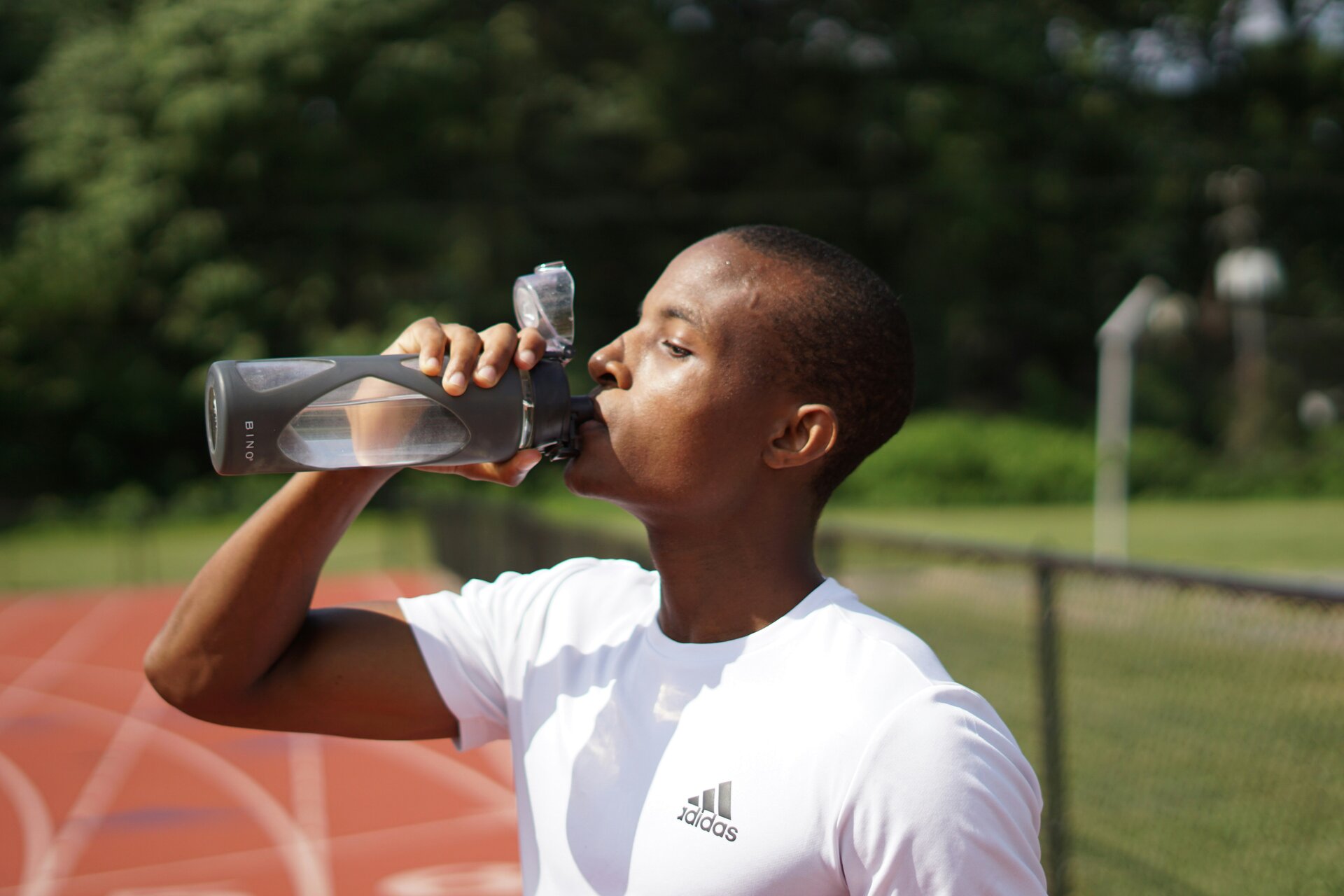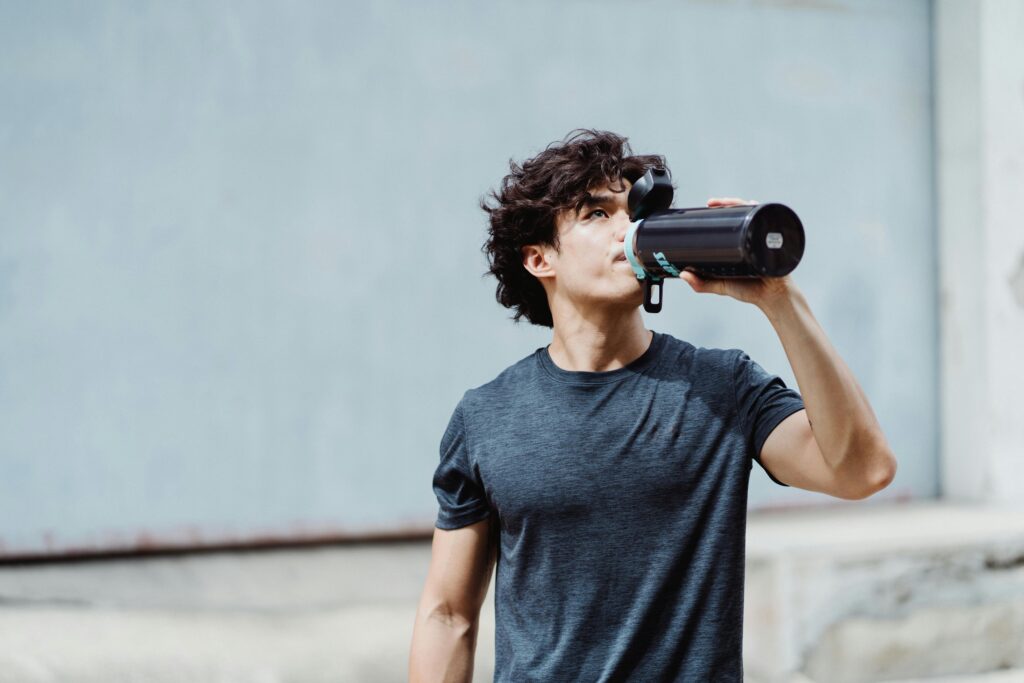Let’s be honest. We often focus on workouts, gear, and diet, but forget one of the simplest performance boosters out there: water.
In fact, one of the fitness motivation tips we swear by is to prioritize hydration. Staying hydrated isn’t just good for your health. It also directly impacts your energy, endurance, and recovery after exercise.
Whether you are crushing a HIIT session, jogging around the block, or just getting back into fitness, hydration during exercise can make or break your performance. Fluid loss can lead to dehydration, which can cause significant declines in strength, stamina, and focus.
This guide covers everything you need to know about staying hydrated while working out, from how much to drink to when to drink and the hydration mistakes that might be holding you back.
Why is Hydration Important During Exercise?
We often overlook hydration during exercise, even though it’s one of the most important foundations of our performance. Whether you are doing strength training or just squeezing in a quick morning session, staying properly hydrated can be the difference between feeling strong and feeling sluggish.
Let’s explain why hydration deserves a front row seat in your fitness routine.
1. Water does more than you think.
When you exercise, your body goes into high gear, and water is what keeps everything running smoothly.
Here’s what water actually does while you are moving:
- Regulates body temperature: Sweating is the body’s natural cooling mechanism, but without enough fluids, our body struggles to cool down. In fact, research regarding hydration effects on temperature regulation shows that when you are dehydrated, your body stores more heat and loses its ability to regulate temperature efficiently, increasing the risk of fatigue, heat exhaustion, or even heatstroke.
- Aids nutrient delivery: Water helps carry oxygen and electrolytes (like sodium and potassium) to your muscles, so they can perform at their best.
- Supports joints and muscles: Dehydration makes muscles stiff, tired, and more prone to cramping, which is not a great combo mid-workout.
- Improves focus and coordination: Even mild dehydration can slow your reaction time and mess with your mental clarity. If your workout feels off, it might be your dehydration, not your effort.
Quick Tip: When you are feeling “off” during a workout, try sipping water and see if it makes a difference. Often, it does.
2. Real impact of dehydration on your performance.
You might not feel it right away, but even a little dehydration can sneak up on you, and tank your performance fast.
Here’s what can happen when you are not hydrating enough during exercise:
- Early fatigue and burnout: Your muscles lose efficiency when they are dehydrated, which means you tire out quicker, even if you have done this workout before.
- Your heart works harder: Less fluid in your bloodstream = more work for your heart to keep blood flowing. You might feel dizzy or lightheaded as a result.
- Weaker lifts and slower strides: Dehydration directly impacts your strength and power. If your output feels lower than usual, lack of fluids can be the culprit.
Think of it this way: dehydration does not just make you feel tired, it limits how hard you can actually push.
3. Signs you are dehydrated (before it’s too late).
One of the best hydration habits is knowing how to spot dehydration early so you can fix it before it drags you down.
Mild dehydration:
- Dry mouth
- Increased thirst
- Slight headache or fatigue
- Dark yellow urine
Moderate to severe dehydration:
- Dizziness or feeling lightheaded
- Muscle cramps
- Rapid heartbeat
- Brain fog or confusion
- No longer sweating (warning sign!)
- Signs of heat exhaustion or heatstroke
If you are unsure, check your urine. Your urine is one of the easiest ways to tell if you are hydrated. Pale yellow? You are good. Dark? Time to drink!
How Much Water Should You Drink During Exercise?
Hydration during exercise isn’t a one-size-fits-all thing. It depends on your body size, sweat rate, workout intensity, and even the weather.
But whether you are heading into a long training session or just squeezing in a quick morning workout, here’s a solid game plan you can follow:
Before your workout.
Start hydrating well before you begin. Aim to drink about 500 to 600 ml (17 to 20 oz) of water around 2 to 3 hours before exercise. Then, follow it up with another 200 to 300 ml (7 to 10 oz) roughly 20 to 30 minutes before you get moving.
This is especially important if you’re doing a quick morning workout, where your body is already slightly dehydrated from sleep.
During your workout.
While exercising, aim to sip 200 to 300 ml (7 to 10 oz) of water every 10 to 20 minutes.
If you’re working out in hot or humid conditions, or doing a long endurance session, increase that amount and consider adding electrolytes to prevent cramping or fatigue.
After your workout.
Don’t stop hydrating once your workout ends. You have likely lost a good amount of fluids (and possibly electrolytes, too) through sweat.
A good rule of thumb? Drink 450 to 700 ml (16 to 24 oz) of water for every pound of body weight lost. If your session was intense or left you drenched, reach for electrolyte-rich fluids to help replenish what your body burned through.
What is the Best Way to Stay Hydrated During Exercise?
Hydration during exercise isn’t just about sipping water when you’re thirsty; it’s about staying ahead of dehydration.
The goal is to maintain your fluid balance, replenish electrolytes, and keep your body performing at its best before, during, and after your workout.
Here’s how to stay on top of your fitness routine:
1. Start strong with pre-workout hydration.
If you wait until you’re already sweating to start drinking, you’re too late. Proper hydration starts hours before your workout even begins.
Here’s a simple pre-workout hydration plan:
- Drink 500 to 600 ml (17 to 20 oz) of water around 2 to 3 hours before you train.
- Top it up with 200 to 300 ml (7 to 10 oz) about 20 to 30 minutes before you begin.
- Working out first thing in the morning? Your body’s already a bit dehydrated from sleep. Drink at least 500 ml (17 oz) as soon as you wake up.
Bonus Tip: If you’re training in hot weather or for longer sessions, include electrolytes (like sodium and potassium) to help prevent early fatigue. And avoid too much caffeine or alcohol before you train, they’re both dehydrating.
2. Always hydrate during your exercise.
Staying hydrated while working out is all about consistency, not chugging water when you suddenly feel thirsty!
Here’s what to do:
- Sip 200 to 300 ml (7 to 10 oz) of water every 10 to 20 minutes during your workout.
- Plain water is usually enough for shorter sessions (under 60 minutes).
- Add electrolytes to maintain energy and avoid cramps for longer, intense, or sweaty workouts.
Not sure when to reach for plain water or grab a sports drink? Here’s a quick guide to help you decide:
| Workout Type | Best Hydration Option |
| Light/moderate (under 60 minutes) | Water is enough |
| High-intensity or long duration | Water + electrolytes |
| Endurance sports (running, cycling) | Sports or electrolyte drinks |
| Hot/humid weather sessions | Sodium-rich hydration solutions |
| High-sweat activities | Water + salt snacks or rehydration |
Pro Tip: If you sweat a lot, you lose sodium, not just water. Try a sports drink, coconut water, or even a small salty snack like pretzels or salted nuts.
3. Rehydrate after your workout for fast recovery.
Rehydrating post-exercise is just as important as fueling up. Your body is in repair mode, and it needs water (and nutrients) to bounce back faster.
Here’s how to rehydrate effectively after your workout:
- Drink 450 to 700 ml (16 to 24 oz) of fluid for every pound of weight lost during your session.
- If you didn’t track weight, just aim to drink water consistently over the next hour.
- Pair your fluids with a meal or snack containing electrolytes and protein for better absorption and muscle recovery.
- Add hydrating foods like watermelon, oranges, cucumbers, or yogurt to your post-workout meal.
If you feel sluggish even after drinking water, you might need more than just fluids. Try an oral rehydration solution, coconut water, or electrolyte tablets to restore balance.
Check out our complete guide to hydration strategies for every environment to fine-tune your routine.
What Are the Most Common Hydration Mistakes to Avoid?
Even with the best intentions, it is easy to get hydration wrong, and those small mistakes can seriously impact your workout performance, recovery, and overall health.
Here are a few hydration mistakes to watch out for:
- Overhydrating without electrolytes. Drinking too much plain water in a short time can dilute sodium levels, leading to hyponatremia (aka water intoxication).
- Ignoring electrolytes. When you sweat, you don’t just lose water; you also lose minerals. Skipping electrolyte replenishment can lead to cramps, dizziness, and fatigue.
- Relying only on thirst. If you wait until you’re thirsty, you might already be dehydrated. Use urine colour and a hydration schedule as better indicators.
- Skipping post-workout rehydration. Recovery starts with fluids. Replenishing lost fluids and electrolytes right after your workout is key to faster recovery.
- Not adjusting for climate or intensity. Hot weather, cold conditions, and high-intensity workouts all change your hydration needs, so plan accordingly.
Check out our guide to the most common hydration mistakes.
Final Takeaway
Hydration during exercise isn’t just a fitness tip. It is a foundation for better performance, quicker recovery, and feeling great while you move.
Whether you’re powering through a HIIT session or easing into a quick morning workout, the way you hydrate before, during, and after your workout matters more than you think. It affects your energy, your focus, and your long-term progress.
So don’t leave it to chance.
Build hydration into your routine the same way you plan your workouts or meals. Make it intentional, consistent, and tailored to your needs.
FAQs about Hydration During Exercise
Commonly asked questions…


